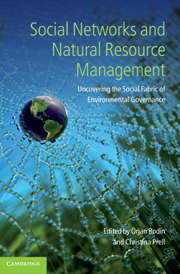 Social Networks and Natural Resource Management
Social Networks and Natural Resource Management Book contents
- Frontmatter
- Contents
- Contributors
- Foreword
- Part I Introduction
- Part II Case studies
- 4 Barriers and opportunities in transforming to sustainable governance: the role of key individuals
- 5 Social network analysis for stakeholder selection and the links to social learning and adaptive co-management
- 6 Who and how: engaging well-connected fishers in social networks to improve fisheries management and conservation
- 7 The effects of social network ties on the public’s satisfaction with forest management in British Columbia, Canada
- 8 Social network models for natural resource use and extraction
- 9 Friends or neighbors? Subgroup heterogeneity and the importance of bonding and bridging ties in natural resource governance
- 10 The role of individual attributes in the practice of information sharing among fishers from Loreto, BCS, Mexico
- 11 Transformative collective action: a network approach to transformative change in ecosystem-based management
- 12 Social networks, joint image building, and adaptability: the case of local fishery management
- 13 Agrarian communication networks: consequences for agroforestry
- Part III Summary and outlook
- Index
- References
11 - Transformative collective action: a network approach to transformative change in ecosystem-based management
from Part II - Case studies
Published online by Cambridge University Press: 05 June 2012
- Frontmatter
- Contents
- Contributors
- Foreword
- Part I Introduction
- Part II Case studies
- 4 Barriers and opportunities in transforming to sustainable governance: the role of key individuals
- 5 Social network analysis for stakeholder selection and the links to social learning and adaptive co-management
- 6 Who and how: engaging well-connected fishers in social networks to improve fisheries management and conservation
- 7 The effects of social network ties on the public’s satisfaction with forest management in British Columbia, Canada
- 8 Social network models for natural resource use and extraction
- 9 Friends or neighbors? Subgroup heterogeneity and the importance of bonding and bridging ties in natural resource governance
- 10 The role of individual attributes in the practice of information sharing among fishers from Loreto, BCS, Mexico
- 11 Transformative collective action: a network approach to transformative change in ecosystem-based management
- 12 Social networks, joint image building, and adaptability: the case of local fishery management
- 13 Agrarian communication networks: consequences for agroforestry
- Part III Summary and outlook
- Index
- References
Summary
Introduction
There is great need for modern societies to find more sustainable ways of securing good living environments and the resources upon which societies depend. In the academic community this has spurred an interest in what has been called transformative change, i.e. how “old” regimes of natural resource management deemed as non-sustainable can transform so as to establish “new” regimes of ecosystem-based management (Olsson et al., 2004 and references below). This is often described as a shift from top–down bureaucracies that narrowly focus on a single (and commercially viable) species (e.g. a fish or a crop), to a more integrated approach that acknowledges a wider array of stakeholders, and that monitors and builds knowledge of landscape-level ecological processes (such as water flows and pollination) that underpin ecological functions (Olsson et al., 2004). Ecosystem-based management has been argued to better cope with the interconnectedness, uncertainties, and dynamics of ecosystems in a human-dominated world (Holling, 1978; Christensen et al., 1996).
Information
- Type
- Chapter
- Information
- Social Networks and Natural Resource ManagementUncovering the Social Fabric of Environmental Governance, pp. 255 - 287Publisher: Cambridge University PressPrint publication year: 2011
References
Accessibility standard: Unknown
Why this information is here
This section outlines the accessibility features of this content - including support for screen readers, full keyboard navigation and high-contrast display options. This may not be relevant for you.Accessibility Information
- 14
- Cited by